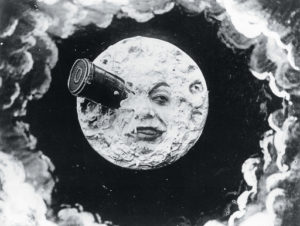
Melies’s Moon
A little research reveals that psi-fi goes back hundreds of years. There were many stories and novels that used changes in technology (actual, extrapolated or imagined) to highlight aspects of human psychology. So even though I have only just invented the category, it goes back a long time.
For example, in 1874, French writer Villiers de l’Isle-Adam wrote The Glorification Machine, in which he imagined “twenty-thousand androids from the workshop of Thomas Edison” who would sit in an audience and automatically applaud or boo a performance as required by their controller. The piece was presented as a satire of audience behavior. It was not about the robots. It was twenty-thousand “automated electro-humans,” used to illustrate how people can act like automatons. That’s psi-fi.
Likewise, Karel Capek’s R.U.R. (1921) usually translated from the Czech as “Rossum’s Universal Robots,” is an example of psi-fi and it introduced the word “robot” into the English lexicon. Lifelike robots are manufactured by the millions as servants and laborers so humans will never have to work again. Predictably, the robots decide they’re being exploited and revolt against their human masters.
Question: Is it about the robots? Partly, it is. They’re described in some detail and there is a golly-gee-whiz factor around the very idea of androids. But I suggest that the main thrust of the story concerns labor relations.
In those early days of the twentieth century, automation, such as Ford’s assembly line, threatened to take over human life. Assembly line factory work was mind-numbing and alienating, treating workers as little more than robots. Labor unions were becoming stronger and disruptive, and the communist paradise was proclaimed to be just around the corner. World War I had just ended and the horror of technology in warfare was fresh. Remarkably, this short play reflects all those human anxieties. That counts as psi-fi.
By contrast, consider George Melies’s early sci-fi movie, Voyage to the Moon (1902). Explorers are fired from a cannon to land on the moon (a space travel “technology” later picked up by Jules Verne), where they are chased around by lunar aliens that look like insects. Is anything about human psychology revealed and examined? No, the film is totally wacky. It is widely regarded as one of the first sci-fi movies, but it is not psi-fi in the least.
In 1953 Arthur C. Clarke wrote The Nine Billion Names of God, a story in which two scientists sell a computer to a group of Tibetan monks to list all the names of God. When all the names are listed, according to their religious tradition, the universe will end. The scientists gloat over their swindle. The story ends with this line: “Overhead, without any fuss, the stars were going out.”
Great story. It does attempt to highlight the arrogance of imperialist psychology, but the main point is the gimmick. The computer can do much faster what would take the monks an uncountable number of years. It’s about the technology. It’s sci-fi, but it’s not psi-fi.
Many stories and novels are not clearly on one side of the fence or the other, sci-fi or psi-fi. But a surprising number are easy to categorize, and I’d like to make the distinction sharp, for the promotion of psi-fi.